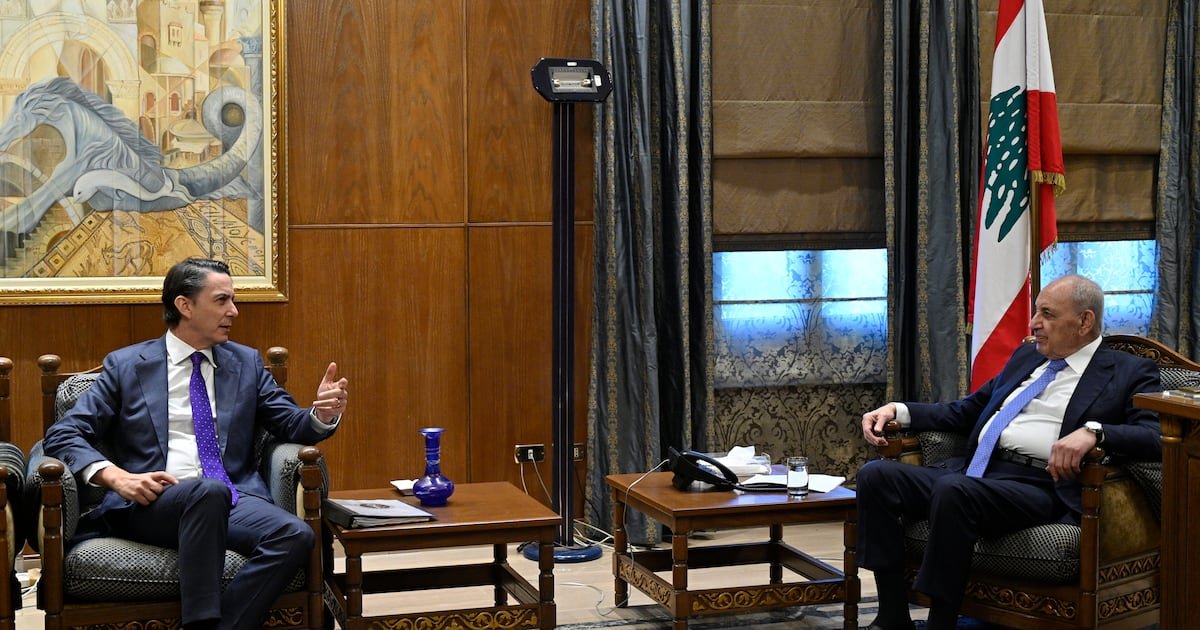Live updates: Follow the latest on Israel-Gaza
US envoy Amos Hochstein said in Beirut on Tuesday there was a “real opportunity” to end the war between Hezbollah and Israel, and that a solution was “within our grasp”.
He made the comments after meeting Nabih Berri, the Lebanese Parliamentary Speaker who is close to Hezbollah and has been negotiating on its behalf.
“I came back because we have a real opportunity to bring this conflict to an end,” Mr Hochstein said of his latest visit to Lebanon’s capital. “This is a moment of decision-making. I am here in Beirut to facilitate that decision but it’s ultimately the decision of the parties to reach a conclusion to this conflict. It is now within our grasp,” he added in a short statement after the talks.
Mr Hochstein, who mediated a landmark maritime border deal between Lebanon and Israel in 2022, said “we have continued to narrow the gaps through the discussions over the last few weeks”.
Moments after the meeting ended, Hezbollah announced that its leader Naim Qassem would give a speech later on Tuesday – before the group then stated that it has been postponed.
There has been renewed optimism in recent days that a ceasefire could be reached soon, driven by US efforts. Israel intensified its attacks on Lebanon in late September, killing thousands and devastating much of the country. More than 3,500 people have been killed and 1.4 million displaced since conflict broke out in the border regions last October, in parallel with Israel’s war on Gaza.
While Hezbollah’s senior leadership has been virtually wiped out, the group continues to launch regular attacks on Israel – including hitting Tel Aviv on Monday night.
US State Department spokesman Matthew Miller said Washington was pushing for “full implementation” of UN Security Council Resolution 1701, which ended the 2006 Israel-Hezbollah war and requires all armed forces except the Lebanese army and UN peacekeepers to withdraw from the Lebanese side of the border with Israel. It also requires Israeli troops to withdraw from Lebanon.
Lebanese caretaker Prime Minister Najib Mikati, who met Mr Hochstein after his talks with Mr Berri, said the country’s priority was a ceasefire, but one that preserved sovereignty over Lebanese territory.
Lebanon has largely backed the US proposal based on the 2006 resolution. However, Israeli Prime Minister Benjamin Netanyahu told parliament on Monday that, even with a deal, Israel would “carry out operations against Hezbollah” to keep the group from rebuilding. Lebanon would strongly object to such a breach of its territorial integrity, Mr Mikati told Mr Hochstein.
Meanwhile, Iran reaffirmed it would not back down from supporting Hezbollah and Damascus following Israel’s intensified bombing campaign in Lebanon and Syria.
“Iran will stand by Syria and the resistance and will not back down from any assistance,” Iranian Foreign Minister Abbas Araghchi said. “We appreciate the position of Damascus and President Bashar Al Assad in supporting the axis of resistance and its reception of Lebanese refugees.”
Mr Araghchi was speaking at a press conference with his Syrian counterpart Bassam Al Sabbagh, who was visiting the Iranian capital amid an escalation of Israeli strikes on Iran-linked targets in Damascus and other parts of Syria. The visit also coincided with Mr Hochstein’s meeting in Beirut to discuss the efforts to reach a ceasefire between Hezbollah and Israel, which could also halt Israel’s strikes on Syria.
“We held very good and positive discussions on regional developments, including Gaza and Lebanon, as well as the strong and strategic relations between the two sides,” Iran’s Foreign Minister said. “There is a definitive will to expand co-operation in various fields and we have stood … and will continue to stand alongside the people and government of Syria.
“The expansionist and aggressive nature of the Zionist regime, from Palestine to Lebanon and Syria, showcases its aim to undermine peace and stability in the region.”
